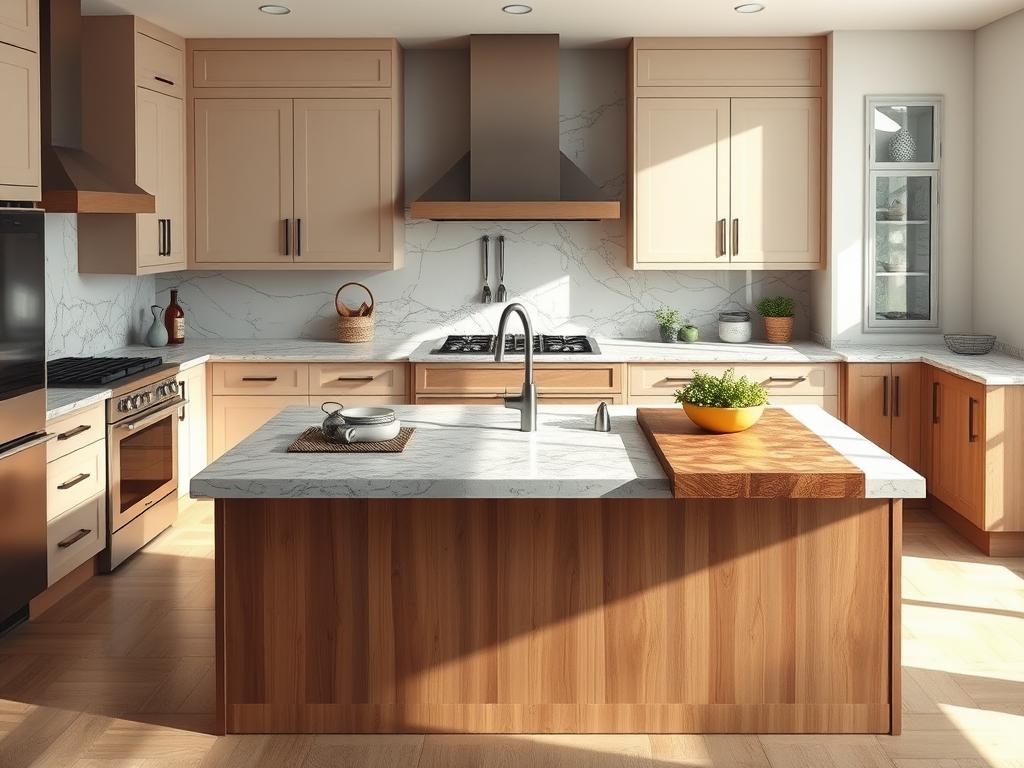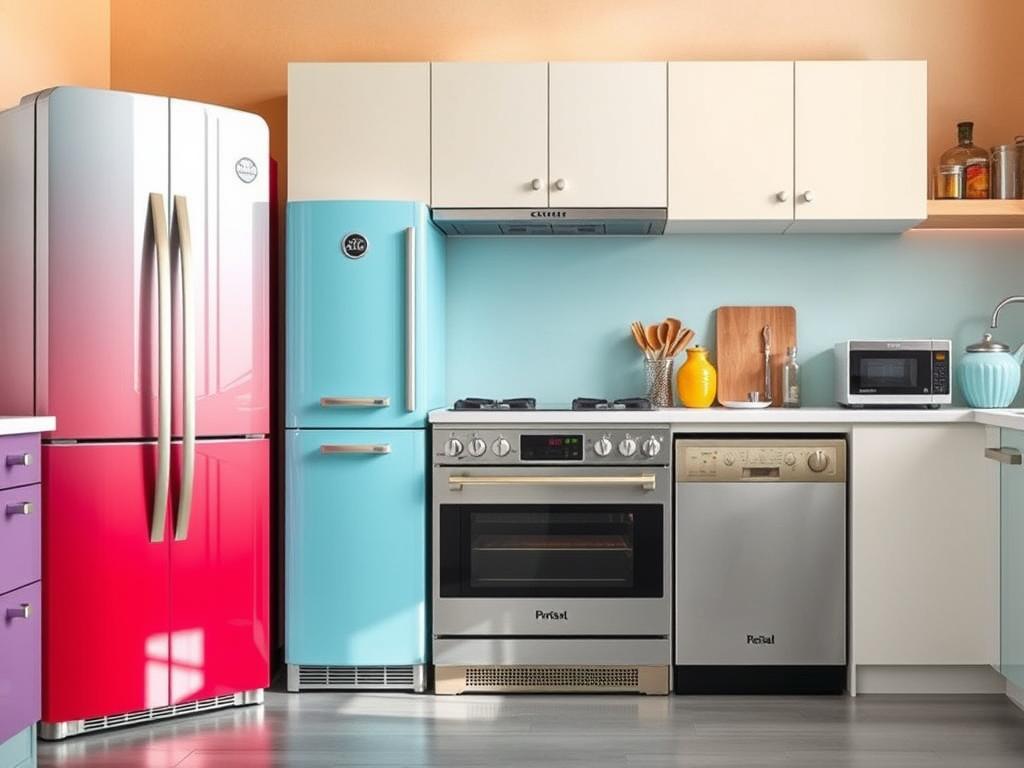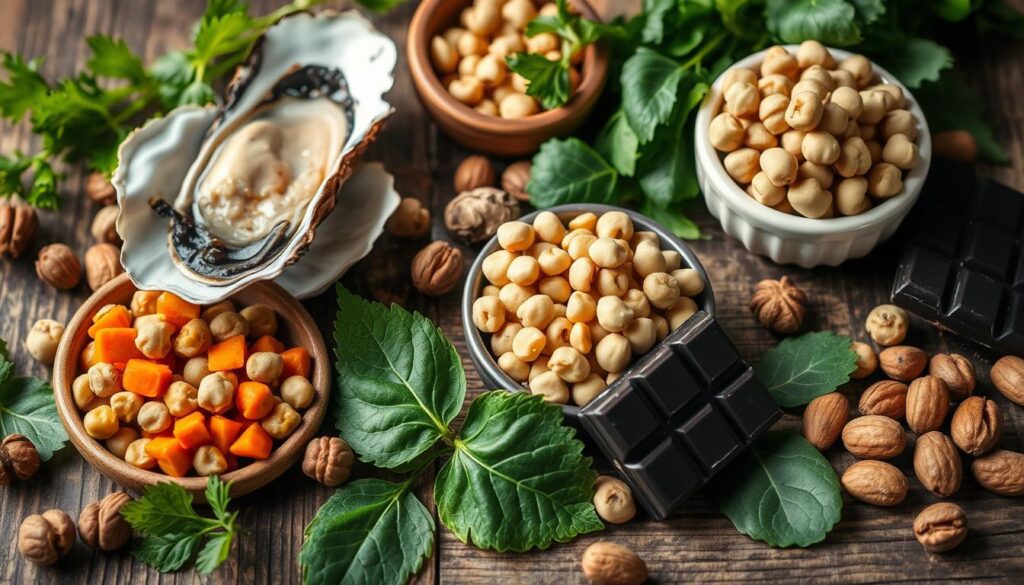Have you ever stood in your kitchen, envisioning the countless memories waiting to be made? The smell of baked bread wafting through the air, the vibrant colors of fresh ingredients on a beautiful surface, or even the laughter shared over family meals? The kitchen is not just a place for cooking; it’s the heart of our homes, and choosing the perfect countertops is a crucial step in creating a space that reflects our lifestyle and preferences. In this guide, we will explore how to choose the perfect countertops for your kitchen, considering factors like durability, style, and functionality.
When selecting kitchen countertops, it’s important to think about your daily habits, such as how often you cook and entertain. This will guide you in deciding among the various kitchen countertop options available, from elegant granite to versatile laminate. Each material has its unique characteristics and will impact both the aesthetics and practicality of your kitchen. Let’s dive into the best kitchen countertop materials to help you make informed decisions that resonate with your personal style, support your cooking endeavors, and fit your budget.
Key Takeaways
- Understanding your cooking habits can guide you in selecting kitchen countertops.
- Countertops should balance both functionality and style within your kitchen design.
- Explore various kitchen countertop options, including natural stones and engineered materials.
- Consider maintenance needs and durability when deciding on the best kitchen countertop materials.
- Stay budget-aware; remember hidden costs can arise when selecting and installing countertops.
- Each material has its pros and cons, influencing both aesthetics and functionality.
- Personalize your kitchen by matching countertop colors and textures with existing decor.
Understanding Countertop Materials
When it comes to picking the right kitchen countertops, understanding the various materials available is essential. This section delves into the characteristics, advantages, and drawbacks of some of the best kitchen countertop materials on the market. Having a clear understanding will help you make informed decisions as you navigate your kitchen countertop buying guide.
Common Materials Used
Several popular countertop materials have stood the test of time. Below is an overview of some widely used options:
- Granite: A natural stone known for its durability and heat resistance. It typically ranges from $45 to $165 per square foot.
- Quartz: An engineered stone that offers a non-porous surface ideal for a modern kitchen. Prices range from $50 to $165 per square foot.
- Marble: Renowned for its elegance and aesthetic appeal. Marble is more expensive than granite, often priced beyond $85 per square foot.
- Butcher Block: A wooden option that is budget-friendly and perfect for food prep, usually less expensive than granite and quartz.
- Laminate: One of the most affordable choices, costing between $25 and $65 per square foot. It comes in a wide array of styles.
- Concrete: A customizable material that can be designed to fit any kitchen style. While stylish, it may crack over time.
- Soapstone: An expensive option due to its unique charm and classic appearance. It’s worth considering if you desire a high-end feel.
- S stainless steel: Often found in commercial kitchens, it’s durable but can be cost-prohibitive compared to other materials.
- Ceramic Tile: Offering versatility, ceramic tiles fall in the mid-range cost, providing an aesthetically pleasing surface.
Pros and Cons of Each Material
Understanding the pros and cons of these materials can help you choose wisely:
| Material | Pros | Cons |
|---|---|---|
| Granite | Durable, heat-resistant | May require sealing |
| Quartz | Non-porous, varied designs | Higher cost |
| Marble | Timeless elegance | Soft, prone to staining |
| Butcher Block | Warm aesthetic, affordable | Requires maintenance, can harbor bacteria |
| Laminate | Affordable, various styles | Less durable compared to stone |
| Concrete | Customizable, sturdy | Can crack, higher installation cost |
| Soapstone | Beautiful, unique look | Expensive |
| Stainless Steel | Very durable | High cost, prone to scratches |
| Ceramic Tile | Variety of designs | Grout lines can stain |
Sustainable Options
Environmentally conscious consumers may want to consider sustainable materials. Options such as recycled glass countertops and bamboo are becoming increasingly popular. These materials are not only eco-friendly but can also add unique textures and designs to your kitchen. For those seeking inspiration, explore how you can create delicious homemade snacks to enjoy while working in your kitchen by trying out some new recipes from your favorite sources like this link.
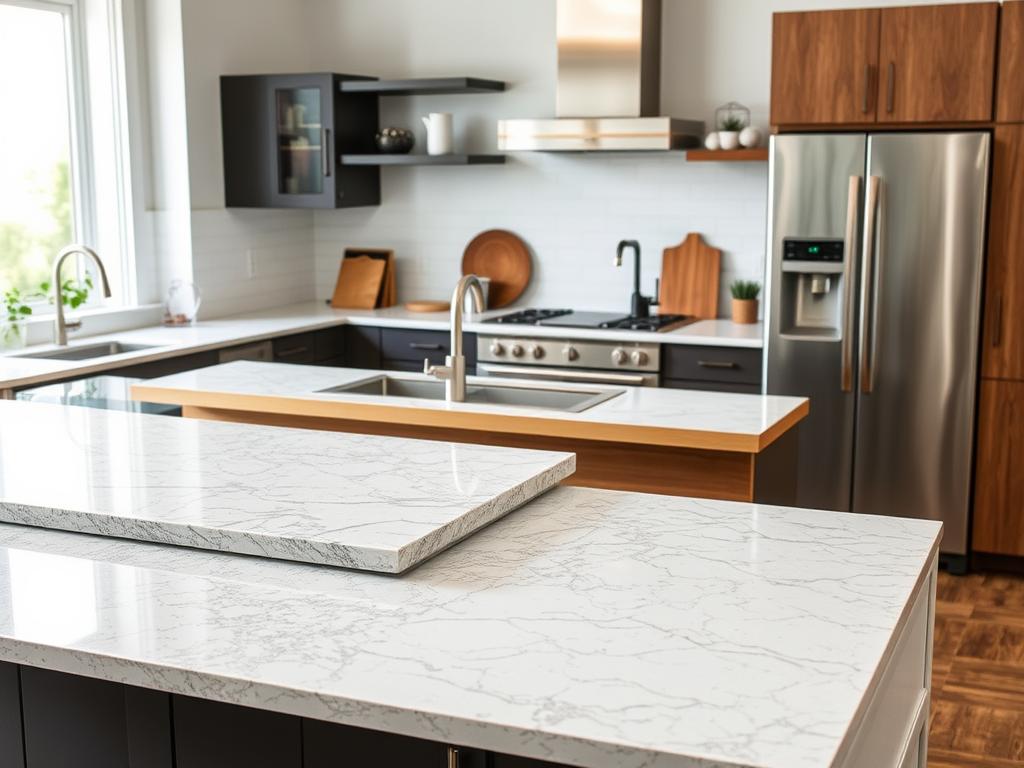
Style and Design Considerations
When it comes to selecting kitchen countertops, understanding how to match the materials with the overall kitchen aesthetics is essential. The right countertop not only enhances functionality but also contributes to the room’s visual appeal. Through various kitchen countertop ideas, homeowners can explore how different materials embody diverse styles, whether it be rustic, modern, or traditional.
Matching with Kitchen Aesthetics
The choice of countertop can significantly influence a kitchen’s look and feel. For instance, sleek quartz surfaces add a contemporary touch, making them a popular option in modern designs. In contrast, materials such as butcher block can evoke a cozy farmhouse vibe. Considering your kitchen’s style helps in choosing materials that create harmony.
Importance of Color and Texture
When selecting kitchen countertops, color and texture play a crucial role in achieving a cohesive look. Bold colors can make a powerful statement, while neutral tones often offer versatility. Textured surfaces, like those found in natural stone or wood, add depth and interest. Think about the kitchen countertop trends that highlight the use of vibrant colors and mixed materials to capture attention.
Current Design Trends
Being aware of current design trends can inspire homeowners to create stunning spaces. The rise of sustainable materials, such as recycled glass and eco-friendly composites, reflects a shift towards environmentally conscious choices. Furthermore, the customization capabilities of concrete countertops allow for unique shapes and colors, appealing to those seeking personalization. Keeping up with these kitchen countertop trends facilitates making stylish yet practical choices.
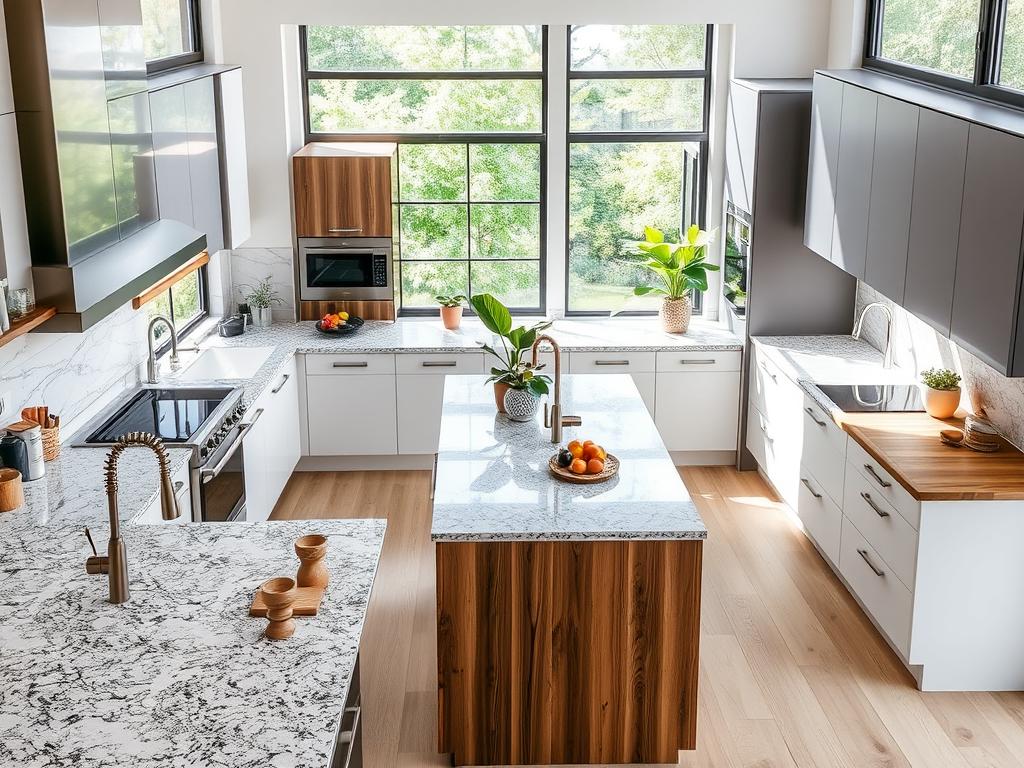
| Countertop Material | Style | Durability | Maintenance |
|---|---|---|---|
| Quartz | Modern | High | Low |
| Concrete | Industrial | Medium | Medium |
| Soapstone | Classic | High | Low |
| Stainless Steel | Contemporary | High | Low |
| Granite | Traditional | High | Medium |
| Laminate | Budget-Friendly | Low | Low |
| Wood | Rustic | Medium | Medium |
Durability and Maintenance Needs
Choosing the right countertop for your kitchen involves carefully assessing countertop durability as well as understanding the maintenance requirements of various materials. Each type of countertop offers distinct advantages and challenges, making it essential to align your choice with your lifestyle and cooking habits.
How to Assess Durability
When selecting kitchen countertops, evaluating durability is key. Durable materials can withstand the daily wear and tear of a bustling kitchen. Here are some notable options:
- Granite: Requires sealing every 1 to 2 years to prevent stains.
- Quartz: Known for being non-porous, this material is resistant to scratches and stains, with some brands like Cambria offering a lifetime warranty.
- Marble: Although elegant, it is prone to scratching and staining, necessitating regular upkeep.
- Soapstone: Highly resistant to stains and heat, it boasts a smooth matte finish but has limited color variations.
Maintenance Required for Different Materials
Maintaining kitchen countertops differs greatly among materials. For example, granite and marble need routine maintenance, while quartz offers a more hands-off approach. Here’s a breakdown of maintenance needs:
| Material | Maintenance Needs |
|---|---|
| Granite | Seal every 1-2 years |
| Quartz | Low maintenance; occasional cleaning |
| Marble | Regular sealing and cleaning |
| Soapstone | Minimal maintenance; oiling recommended |
Understanding your needs and lifestyle is crucial when selecting kitchen countertops. For families who cook frequently, durable options like quartz enhance both functionality and aesthetics while requiring less effort for maintenance. To further explore how routine checkups play a role in wellness, one can find insights at this resource. Investing in the right countertop material builds a solid foundation for a beautiful and long-lasting kitchen.
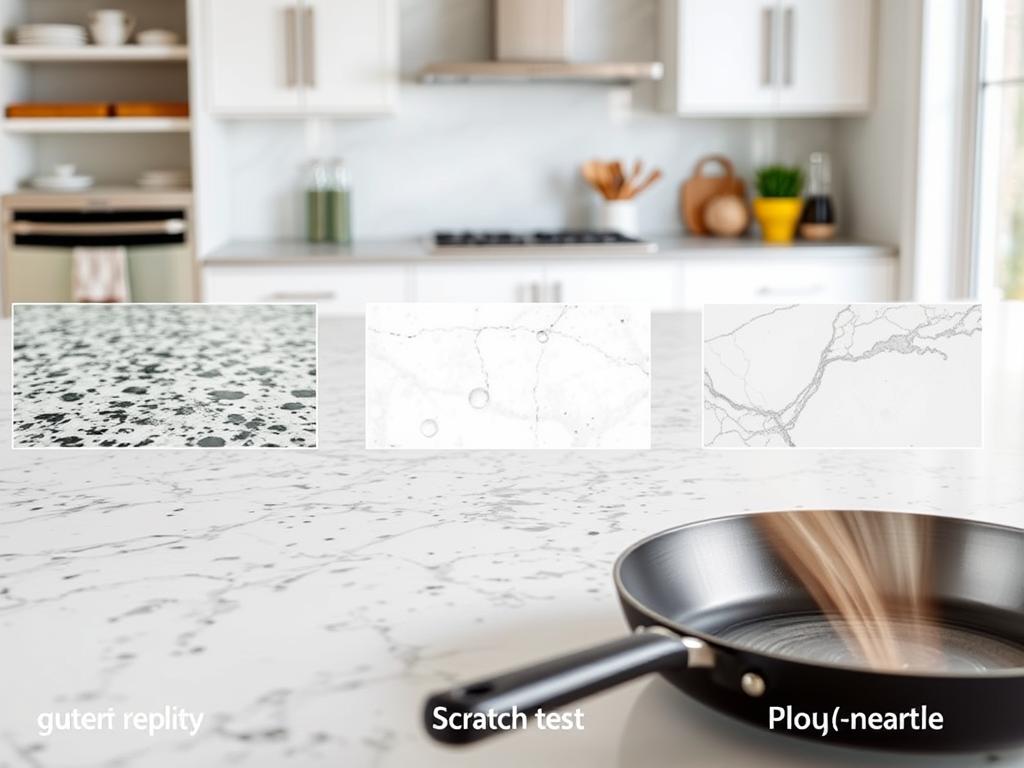
Budgeting for Your Countertops
When planning a kitchen renovation, budgeting appropriately for your countertops is crucial to achieving your desired aesthetic and functionality. Countertops are a centerpiece in your kitchen and can significantly impact your overall renovation budget. Understanding the various costs involved, including evaluating overall costs, helps in making informed decisions.
Evaluating Overall Costs
Generally, homeowners should allocate about 10-20% of their total renovation budget for countertops. For a kitchen renovation costing $50,000, this translates to spending between $5,000 and $10,000 on countertops. Similarly, for a $30,000 bathroom remodel, it’s wise to plan for $3,000 to $6,000 dedicated to countertops. Selecting materials like granite, quartz, or marble will further influence these numbers, as they come with varying price points and installation intricacies.
Hidden Costs to Consider
Beyond the basic costs, be aware of hidden countertop costs that can creep into your budget. Factors such as sealing treatments, custom fabrication, and ongoing maintenance can add up. For instance, granite and quartz may have additional installation fees due to their density. Also, remember that future upkeep costs influence your investment. Each material presents its own maintenance demands, so researching these aspects will prove beneficial.
Financing Options
Financing kitchen countertops can make investing in quality materials more manageable. Options range from personal loans, which allow you to pay off your countertop expenses over time, to store financing plans that many retailers offer. Utilizing these financing pathways can provide flexibility, ensuring you invest wisely in your kitchen upgrades without compromising quality.
For more tips on effectively managing your countertop budgeting, explore this helpful guide.
Installation Process and Considerations
When it comes to installing kitchen countertops, homeowners face a choice between tackling the project themselves or seeking professional assistance. Each option has its own set of benefits and drawbacks, especially when considering the complexity of the task. DIY kitchen countertops can save on labor costs, but they require a certain level of skill, time, and access to specialized tools. On the other hand, professional countertop installation guarantees expert craftsmanship and can prevent potential issues that may arise from inexperienced handling.
DIY vs. Professional Installation
Opting for DIY installation can be a rewarding experience for those confident in their abilities. However, accurately measuring materials, ensuring perfect cuts, and correctly aligning with other elements like sinks or backsplashes are critical to achieving that polished look. Using materials like quartz, which are known for their durability, could simplify the process since they don’t require sealing. Yet, the elegance of granite may call for a professional touch, especially when dealing with the intricate patterns and weight involved in its installation.
Timeline for Installation
The installation timeline can vary widely based on your approach. A professional installation team typically completes the job in a matter of hours to a couple of days, depending on the project size and complexity. For those choosing the DIY route, plan for several days of preparation, including measuring, cutting, and installation. Having a clear timeline helps you manage the logistics and avoid frustrating delays.
Tips for a Smooth Installation Process
To ensure a seamless experience, follow these smooth countertop installation tips: start with detailed measurements, as accuracy is key to a successful fit. Handle materials carefully to avoid scratches, and ensure all necessary tools are on hand before beginning. Whether you decide on DIY kitchen countertops or professional help, being organized and prepared can significantly minimize stress.

